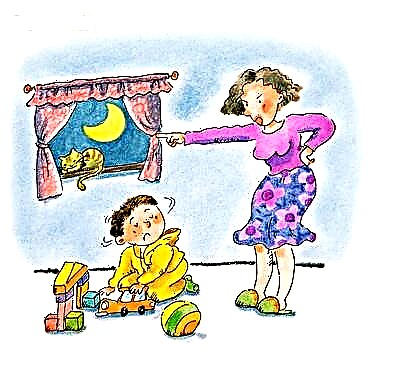Adding a family is a great happiness for parents. When the birth went well and the child develops according to age standards, the mother is rarely worried about the child's moodiness. Parents cannot get enough of when the baby grows up calm and accommodating. Moms and dads get used to it, and it seems to them that it will always be so. But suddenly everything changes. The child began to be capricious, often cries, does not give in to persuasion. This often happens towards the end of the first year of life. Why it happens?

Whims of children under 1 year old
To understand whether a child under the age of 1 year can be capricious, we propose to understand the psychological characteristics of the development of the baby:
- Newborn crisis
The crisis manifests itself in the interval from birth to 2 months. This is a very important stage in a child's development. And the timely emergence of a crisis is the norm. Your child should react to the approach of an adult, make sounds (vocalizations) when communicating with his mother, react with a smile. Weight loss is the main symptom of a crisis.
- Infancy
This is the second stage in the development of a child up to one year old. Most often, it appears from the second month to a year. At this time, the baby communicates through emotions. And it is important for parents to pay great attention to communication. Gradually, the little one utters the first words, studies the world through actions with objects of the environment.
Crying and babbling during this period indicate a desire to establish contact with an adult. And when the child's independent speech appears, the crisis is over.
Having studied the most important psychological characteristics of children during this period of development, we will try to figure out whether the whims of a child under one year old carry something serious.
What are whims. Can a newborn baby be naughty
Whims are understood as various whims and stubbornness. At an early age, the basic needs of the child and the feeling of discomfort are hidden under the guise of a whim. Sometimes, when they call their baby under one year old capricious, mothers misinterpret the very definition. After all, crying and anxiety of a child at such a tender age is the only way to communicate with relatives. There are no words in their arsenal, gestures are also poorly expressed - all that remains is to roar. And there can be several reasons for the disorder. The first, natural - the child wants to eat, he has wet diapers, or he is cold. It is also possible that the baby asks for help when something hurts. A caring mother will immediately help the baby.
- Make sure the baby is dry. Children often signal with crying to change the diaper;
- An important cause of concern is crumbs hunger. To avoid this, you should feed the baby on time;
- If you have already fed your baby and are sure that there is no more discomfort, but he continues to cry, gas or colic may be the cause. One of the most common reasons for the capricious state of children under one year old;
- Change of weather, magnetic storms. It is already difficult to find a specific recipe. Pay more attention to your baby on this day, wear it on the arms, sleep together;
- Continuous crying may be evidence of a disease (see the article on common ailments in newborns);
- From the age of three months, teeth can become the cause of vagaries. Yes, don't be surprised. The gums begin to swell, the child pulls everything that has fallen into his hands into his mouth, there is abundant salivation - these are the main signs that it is the teething teeth that are bothering him. And even if they come out only after 2-3 months, the problems begin now;
- Daily regime. Children need strict adherence to it. This applies to feeding, sleeping (a clear sleep on a schedule will relieve nervous tension, and the child will begin to whimper noticeably less.), Walks, games, educational activities and even free time. The child reacts sharply to one drop-down element from the mode. Here is a restless day for you 🙂
It often happens that a joyful and festive day, brightly spent with the baby, ends with the whims and tears of the child. He refuses to fall asleep, is overly agitated and difficult to calm down. This behavior for babies 10-18 months old is the result of a nervous overstrain that they have experienced. Their tears are a natural way to relieve stress at this age. After all, a noisy company, new faces, bright colors and unusual sounds - all this turned out to be stress for the baby. Therefore, he gets irritated, cries, is capricious. In such a situation, it is necessary to show maximum care and patience for the child. It does not work out with shouts and threats to make him calm down. It is better to hold the child close to you, wear it in your arms, make procedures pleasant for him: bathe in a warm bath or have a light massage. All this will help the baby to relax and calm down faster.
 Similar concerns and whims in a child may arise in another situation, when the prohibitions of the parents come into force. For almost a year, the baby was confined by the walls of the arena or stroller, surrounded by only familiar things. With the development of the child, he needs to learn new things. He knew nothing else and was satisfied with this.
Similar concerns and whims in a child may arise in another situation, when the prohibitions of the parents come into force. For almost a year, the baby was confined by the walls of the arena or stroller, surrounded by only familiar things. With the development of the child, he needs to learn new things. He knew nothing else and was satisfied with this.
Crawling and making the first attempts to get up off the floor and walk on his own, he thereby broadens his horizons, learns a lot of new things. Not understanding the danger of surrounding objects, the kid explores everything with interest. He has a natural desire not only to examine, but also to feel with his hands, test the strength and taste a new object. This behavior will certainly elicit a reaction from the parents. And most often it is forbidden in the form of shouting and taking away the thing you like.
They raised their voices, took the "tsatsu" and even carried them from an interesting place back to the arena. How, in this case, does the kid express his indignation and desire to continue research in the new world? Only with a cry. So far, this is the only thing he can do to draw attention to himself and his natural need to learn new things. No compromises in the form of old toys or nipples suit him.
To avoid such whims, you should think in advance how to make the discovery of new objects more joyful for the child. Let only those things remain around that he can painlessly explore for himself in taste and shape. And so that parents do not worry about a broken and damaged object, all unnecessary things must be removed: hidden or rearranged higher. We also read: how many toys does a child need
Leave to the discoverer what will bring him joy. Something that can be moved, folded into each other, or will allow you to extract new sounds from objects. After all, unsightly empty boxes, lids, pots and ladles are much more interesting, albeit bright, but already boring toys.
Another reason for the sudden irritation of a child can be difficulties in the formation of speech. The kid is growing, and his speech does not keep up with his development. New desires to do something or attempts to convey their emotions result in mooing or reaching out. Parents do not understand his "hints" and do not help.How, apart from words, to draw attention to yourself and to the problem that has arisen? Again children's screams and whims.They can manifest itself in the refusal of the habitual bathing or using the pot, to which the child is already accustomed. Everything that used to be pleasant to the baby and he willingly accepted it can now cause him displeasure.
In this case, it will not be just a whim, but a signal to parents. In this way, the child expresses what he is not able to express in words. And to fight with such irritability, forcibly breaking it, is not worth it. It is better to take a closer look at the child and find out the reason for his whims. Perhaps the last time you bathed, the water was too hot or the foam stung your eyes. Or maybe with the past use of the pot, the plastic pinched the baby's delicate skin. The negativity experienced at this moment is remembered by the child, and he does not want to repeat it. Therefore, with all his might, he resists another bathing or planting on a pot (we also read: how to teach a child to go to the potty).
The most effective remedy in this situation is time. Do not scold the child for a whim and insist on your own. Give him time to forget about the unpleasant incident and try again after a while.
How to overcome children's whims
With all his behavior, the child shows that he expects understanding from adults. Changes in the baby's behavior sometimes confuse adults and make them want to immediately stop the ugliness and whims.
Whims, screams and crying are not ordinary disgraces that should be stopped immediately. This is another signal from the child that he is waiting for understanding and reaction from adults. He is looking for a way to manage his parents to get what he wants. Everything is used: screams, tears, biting, hair pulling, fighting. And if this works, then this behavior will become the norm, and the child will be able to solve his problems only in this way. This cannot be allowed. And if you do not react to the wrong behavior and show the baby that you cannot achieve anything by whims, then he will begin to change and stop crying and being capricious.
In some situations, learn to ignore your child. Sometimes this is the best solution to the question. The child can stop being capricious and crying faster if there are no people nearby trying to calm him down. The presence of spectators and sympathizers only intensifies the baby's whims and crying. After all, even some adults like to “perform” in public, let alone children.
- Many parents are mistaken, believing that the baby needs to be fondled and carried more. It is not true! Most often, children become capricious when they are surrounded by excessive affection. Psychologists advise not to go to extremes. Yes, the baby needs your attention and affection, however, he also must understand that mom and dad cannot carry him in their arms day and night. They also have their own needs;
- Permissiveness and unlimitedness. From an early age, a child should know the words “No”, “No”, “Stop”... This will be an additional incentive for the discipline of the baby in the future. The presence of these concepts in the upbringing will relieve both the baby and the parents from unnecessary whims. (We read on the topic: how to tell a child correctly);
- The constant attention of elders often becomes the cause of children's whims. By nature, a child cannot communicate exclusively with elders. He becomes tired of the obsessive behavior of adults. Give your little one more freedom. Let him play by himself, take a walk on the street with other mothers, chat with them. And the little ones will exchange gestures and smiles with each other in the stroller;
- Do not overdo it following the previous point. A complete lack of attention will also negatively affect the psychological and emotional state of the baby. With screams and whims, he will demand the attention of loved ones;
- Inconsistency and lack of unity of requirements interfere with the adaptation of the child to the world around him. To avoid this, negotiate with relatives about a single line of upbringing. Monitor your attitude towards your child. If you allowed something yesterday and forbade something today, then you need to explain to the kid why you are doing this. Regardless of the fact that it is still very small. He will understand everything at the level of emotions.
- The most popular whim is the evening when it's time to go to bed. The kid cannot understand why, instead of an interesting game of football with his dad, he should sleep. To make the evening whims a thing of the past, cancel all outdoor games an hour before bedtime - let it be reading a book or watching a cartoon. By the way, in this case, children's programs like "Good night, kids" are very useful - they act as a signal for sleep.
How parents should react
[sc: rsa]
 Start with yourself. Be consistent. Remember consistency. Do not fall for the whimpering of the crumbs. If you have forbidden to take something, then it is taboo! One rule for both parties.
Start with yourself. Be consistent. Remember consistency. Do not fall for the whimpering of the crumbs. If you have forbidden to take something, then it is taboo! One rule for both parties.- Do not overdo it. When you overreact, your toddler may remember your reaction to his behavior. He may misinterpret the current situation and perceive your unusual reaction as a reward for the act - the child may want to repeat again those actions that caused you violent resentment.
- Analyze your baby's daily routine. Make adjustments if necessary. Observe the regime systematically. Make your baby's day different. Pay more attention to walking and changing play activities.
- Praise your child for good behavior. In the event that you constantly focus the baby's attention on negative actions, then he will deliberately repeat them to attract your attention. Try to form a positive attitude in your baby's behavior. By creating a supportive atmosphere at home, you will reduce the child's desire to be in opposition.
- Try to reduce the number of prohibited activities for your baby. Remove items that the baby should not take, use plastic plugs on the control panel of the TV and video equipment, close the doors of lockers and rooms with special locking devices that the child should not get into.
- React quickly. When a child does something that is not allowed, immediately and strictly say "No" to him. If the child repeats the action again, prohibit the action again and take him to another place.
For instance: “Little Vova reached into the closet, took out a glass decanter. The kid doesn't know how to use it. Vovochka dropped the decanter. He crashed. "
What should mom do?
A bad example would be yelling and swearing at a child! Better to do this: “Little Johnny, I was so scared! I was very, very upset! You could get hurt, I would cry for a long time (grimaces)! Please remember that it is forbidden to touch my things without permission! " The last phrase is pronounced in a stern voice, indicating the prohibition.
There are many such examples. Remember that your child's whims are largely up to you. (now we are not talking about when the baby is worried about something)... The most difficult thing in raising a child under one year old is the first month. It is perfectly normal when a newborn baby can cry and be capricious for up to two hours a day. Don't worry, every month you will understand your baby more and more. Love your capricious baby!
From the forums: how to respond to the whims of a child under one year old?
Lyuba Melnik: God be with you, what moods at this age. You need to understand the child, if, as they say, such a kid is capricious, then there is a serious reason: he feels bad, anxious, hungry.
Nellie: The child is not capricious, he either gives you a sign that he has a problem somewhere or attracts your attention, because he cannot yet say.
Alyonushka: Well, what are these whims? the child is not even a year old. he is capricious because something bothers him. he just can't tell.
list: kiss, hug him, carry on handles, be with him always and enjoy everything that he does ...
Vinakova: Children under one year old are not capricious, and even more so they do not “work for the public”! They give signals that something is bothering them. We big aunts and uncles are uncomfortable and want to cry to someone, what can we say about kids who don't know anything about this world? And how to cope with what worries - cry, of course!
Iris: Patiently figure out what the reason is. After all, kids don't do something to spite us - if she whines or is naughty, then something is wrong: wants to eat, drink, sleep, play with mom, something hurts, reacts to the weather, etc.Sometimes, of course, the nerves can't stand it, but you have to control yourself…. the more we are nervous and irritated, the more the child cries….
Lelya:I believe that you cannot always flow to a child. We must give him and shout. When my son starts crying about the fact that he is not given or, when something is forbidden, I still insist on my own. He will shout, he sees and understands that he has not achieved anything with his shout and the next time he is already more calm about prohibitions. Children are very cunning and smart. They very quickly understand that they can be monitored by adults and immediately begin to use it. It should not be allowed that the child becomes the master of the situation!
Verunchik: In my opinion, a baby up to a year still does not know how to be mischievous and play whims. If the baby is crying, then something really worries him. My son just doesn't know how to cry out of harm, he is 1 year 3 months old.
We read on the topic of crying and whims of children:
- Causes of hysteria in children of different ages. How to prevent a child's tantrum? Psychologist's advice on how to cope with child tantrums - https://razvitie-krohi.ru/eto-polezno-znat/kak-borotsya-s-detskoy-isterikoy-sovetyi-psihologa.html
- We read why little newborn babies cry and how to understand the reasons for their cry - https://razvitie-krohi.ru/razvitie-rebenka-do-goda/novorozhdennyiy-rebenok-plachet.html
- How to calm a crying child- part 1 (9 practical tips)
- How to calm a crying child- part 2
- IMPORTANT article for young parents on raising a child up to a year: advice to parents
- And further - psychology of upbringing children under one year old
- Children's whim or selfishness: how is one different from the other?
Video gallery on whims and tantrums
I share the experience of my family, how we prevent whims and tantrums, and what system of punishments and rewards we have developed:

 Start with yourself. Be consistent. Remember consistency. Do not fall for the whimpering of the crumbs. If you have forbidden to take something, then it is taboo! One rule for both parties.
Start with yourself. Be consistent. Remember consistency. Do not fall for the whimpering of the crumbs. If you have forbidden to take something, then it is taboo! One rule for both parties.

